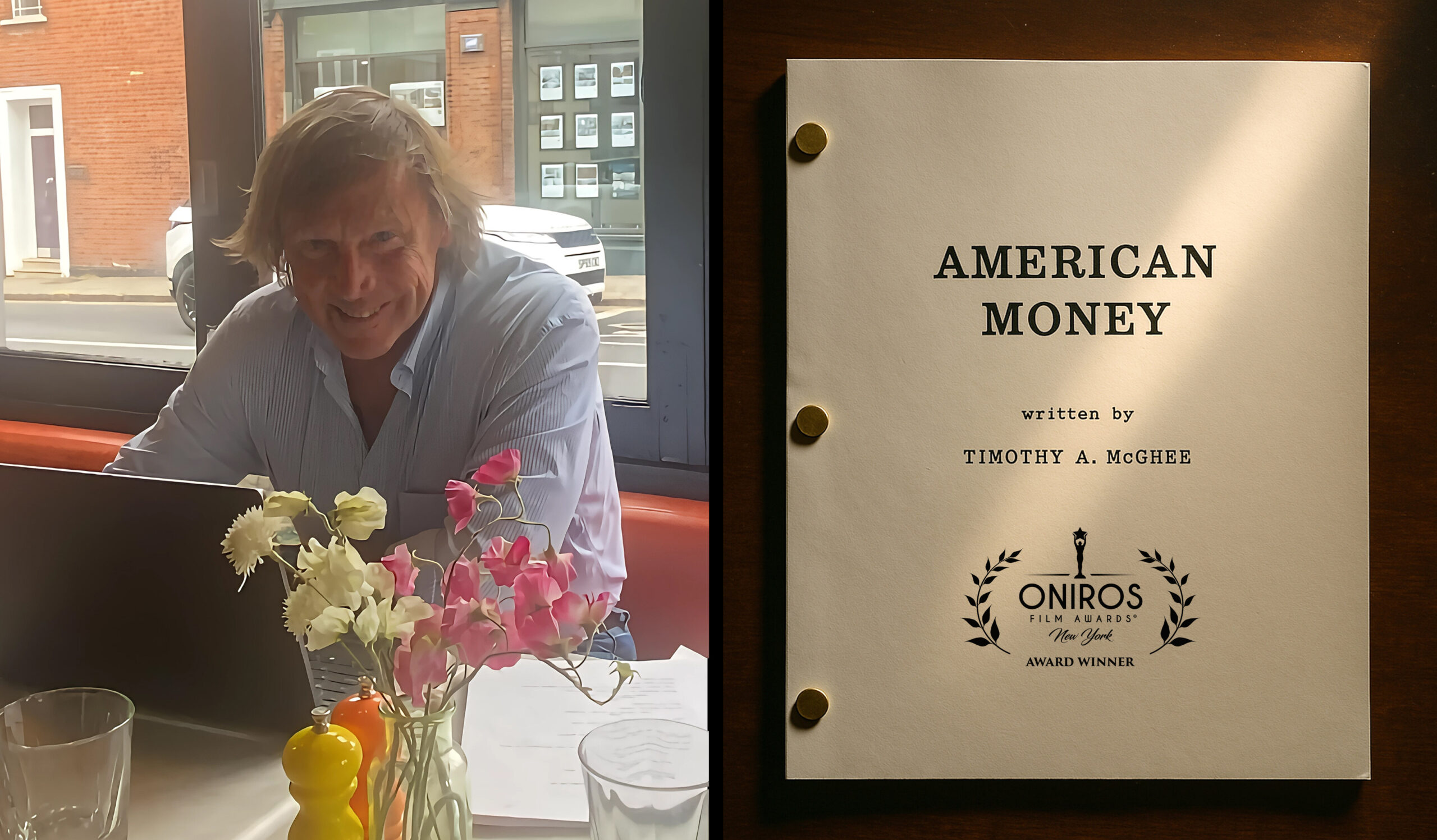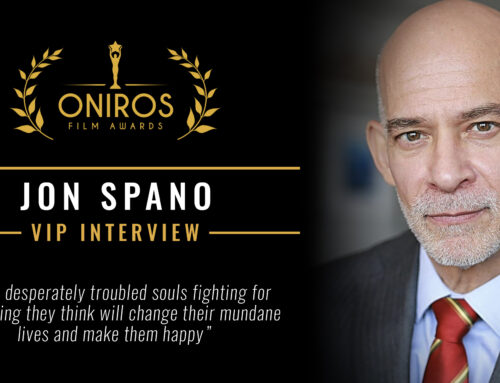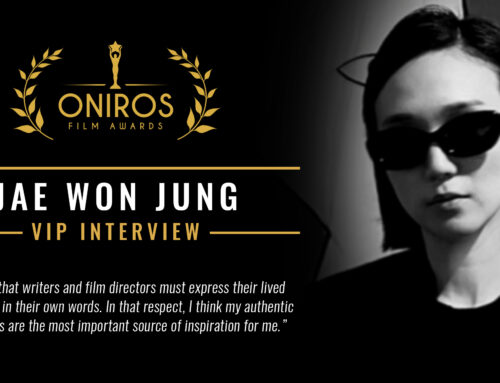BEYOND THE ONIROS FILM AWARDS®
VIP Interview with Timothy A. McGhee, writer of the script ‘American Money’
by Alice Lussiana Parente
Timothy A. McGhee is the accomplished novelist and screenwriter behind American Money. In this interview, we discuss the inspiration behind his characters, McGhee’s family background, and who he envisions as the leading lady when his script comes to life on the big screen.. Enjoy!

1. Can you tell us a bit about your background and what led you to writing?
I’m a lifelong resident of West Virginia (except for 1-1/2 years living in Myrtle Beach, South Carolina during my 66th and 67th years on the planet) with small-town blue-collar roots. My father and grandfathers were railroaders. Many of my high school friends worked on the railroad or in the coal mines. They’re all a great influence on my life. My parents taught my brother and my three sisters the importance of education as well as the essential nature of the arts in making life enjoyable. My father the US Marine Corps drill instructor and veteran of the Battle of Guadalcanal was a free-thinker who, as an example, did not allow guns in the house. He just did what he thought was right. He was a craftsman, a woodworker, painted with oils & acrylics, and was my inspiration as a storyteller. I was also influenced by my older brother, who was fluent in three languages – French, Spanish, and Portuguese – and published a novel which sold 1,800 copies on Kindle in the UK in the gay/lesbian genre. My father’s quest to do the right thing was evident by his immediate acceptance of my brother when my brother “outed” himself when he was 27 years old and I was 16 years old. The Warrior loved his son unconditionally; he did the right thing. That was beautiful.
My mother was intelligent, kind, and supportive. She was a tremendous influence on her five children, especially with our EIGHT college degrees earned: two of us were in education, one sister studied at a seminary, and two earned engineering degrees. My mother read voraciously. My brother taught me to read when I was four years old. We were a family of “bookworms” and that made my mother proud.
Yet, I was different than the other four siblings. I was the bookworm who was a daredevil, possessing a great amount of physical courage. Paragliding and exploring abandoned coal mines whetted my desire to play high school football rather well to be small and not really fast. At just under six feet and 180 lbs, I decided to not pursue any of the three college football offers I received: two partial rides from smaller colleges and one potential appointment to the United States Naval Academy. The lieutenant from Annapolis was impressed with both my test scores and my willingness to hit. However, an athlete knows when he/she has played the final game. Even though mine was November 2, 1973, the fire burned within and has had a huge influence on my desire to be a storyteller like my father and my brother. There’s an element of football in everything I write. I’ve stayed in shape even just a little more than a year away from my 70th birthday. I seriously think I can still block & tackle. Anything is possible, and that belief is manifested in print and now in film.
2. You used to be a mechanical engineer and also worked in design, sales, and research and development. How has that diverse background influenced your writing?
Engineering is science on a budget with the clock ticking. The things I did and learned as a mechanical engineer made me a problem-solver of the highest order. Storytelling is right-brain creative dominant, and structuring a story involves analytical skills. Many of my engineering solutions were creative science, bound by physics & mathematics but solving a human issue. Engineering is therefore an essence of my storytelling.
3. What would you say is your biggest talent?
My biggest talents are my determination to make it happen, and my willingness to do whatever it takes. I do not give up. There’s a line uttered by the protagonist in my first novel Wise Fools, “Yeah, but I’m the guy who would have tried to steer the Titanic into the New York City harbor.” It sounds impractical and impossible, yet that is a perfect description of how I conduct my affairs. I wrote for 33 years before I received my first $1,000 check. And look at me now, on the cusp of selling a film script about a story I conceived 23 years – and two marriages – ago. The two women I loved did not want me to be a writer; they made that point clear. Yet, here I am, and they are not, and I’m enjoying an awesome celibate storytelling life!
4. American Money is based on your second novel: Risk, Return, and the Indigo Autumn. Can you tell us more about the novel, and what motivated you to adapt it into a screenplay?
After a year in a sweet mechanical engineering job just out of college – the magna cum laude ink was still damp on my diploma – I was trapped in the Great Recession of 1983. Unemployment was over ten percent nationwide and twenty percent in West Virginia. I had to do something, so I went with the “hot hand” at the time – Wall Street. Investment firms were hiring stockbrokers by the tens of thousands. I talked them into taking a chance on me. I didn’t do too badly for a guy who didn’t have any wealthy friends or uncles. I was willing and determined, so I built a clientele through the both the print and visual media, through newsletter-writing, and public speaking. This all took me to early October 1987, when an investment analyst with my firm was interviewed by the widely-read weekly financial periodical Barron’s in which he essentially said “Folks, after five years, the party is over.” I believed him, but none of my clients wanted to sell. Two weeks later? Black Monday. The stock averages fell 25 percent in one day! That day eventually fired my storytelling imagination: What if I would have bet the farm on the stock market collapsing? Hence, my second novel, and subsequently my first film script, was born.
5. Who are the writers or screenwriters that inspire you the most?
Novelists, in no particular order for no particular reason: Walter Kirn. Scott Turow. John Grisham. William F. Buckley, Jr. C.S. Lewis. Ernest Hemingway. Robert B. Parker. John Steinbeck. Norman Wood.
Screenwriters or Film Storytellers, again in no particular order for no particular reason: Quentin Tarentino. Stephen King. J.J. Abrams. Gene Roddenberry. George Lucas. Spike Lee. Shonda Rhimes.
6. We’re living in a time of major stock market shifts, which mke your script feel especially relevant. What inspired you to tell this particular story now?
I’m just lucky that at the time when I finally learned how to write a film script, the stock market story I had in mind since 2002 is popular & relevant.
7. It’s really refreshing to see a woman at the center of a story set in the world of finance—a world often male-dominated. What inspired the character of Edie?
When I was a stockbroker in Charleston West Virginia in the years 1983 through 1990, of the several dozen individual stockbrokers in my city only one was a woman. She was a badass, just like Edie, in her late 30s, just like Edie, and impressively & financially successful. Just like Edie. Also, just like Edie she faced the constant threat of men sabotaging her career.
The character named Edie had an interesting metamorphosis in my stories. Edie was an art major in Wise Fools published by Writer’s Club Press in 2001. She was a librarian in Risk, Return, and the Indigo Autumn when she appeared in print on iBooks in 2006. Edie became a tough stockbroker in early 2018 when I decided I wanted my stock market story to have a strong feminine influence.
I began my career in 1981 as an engineer when women were entering the workplace landscape in earnest. I was always impressed with women as professionals, in engineering, medicine, law, business, and politics. Women had more to overcome than I ever did as a white man. Women have so much to offer in every aspect of life. They give life and nurture life, that’s a given, but in my opinion if my Roman Catholic Church were not such a “men’s club” priest pedophilia would have been stopped in its tracks. Things go better when women are involved. So, I wanted to put the emphasis on a strong woman making money decisions.
Still, despite my opinion I am enlightened, I was fortunate my two writing teachers are women. One especially, and appropriately, implored me to do a better job getting the strong-woman-leader point across. She made the valid suggestion I was still too much making the story Mason-centric. I’m damned glad I listened to her, because I love the results: Edie is indeed a badass.

Timothy A. McGhee, writer of the script American Money
8. The rhythm of the story mirrors the volatility of the stock market—there are highs, lows, and bursts of momentum. How did you approach pacing the narrative to reflect that energy, while keeping readers emotionally connected to the characters?
It all begins with the characters’ reaction to the stock market, which in this story was exacerbated by two aspects: a. the market was volatile in an unprecedented fashion, and b. short-term trading of options can and will make the volatility vibrate even more. I trade options often to this day. I know how overwhelming and mentally-draining trading can be. Money elicits emotions anyway; trading compounds the emotions exponentially. One aspect of that week before Black Monday? On Friday October 16th we endured the worst dollar-valued drop in history, then everyone had to think about it over the weekend. In the film script, that was a challenge; any pacing was external to the market. That’s why I introduced the fear of jail time.
9. Mason and Edie engage in a philosophical conversation and mention Nietzsche. Why did you choose him in particular? Was there something about his philosophy that felt especially relevant to the story or their relationship?
Friedrich Neitzsche is a terribly misaligned & misunderstood philosopher, in my humble opinion. The story about the Siberian winters and depression is true; a psychiatrist friend said that. I didn’t correct him. I’m personally impressed & inspired by Neitzsche’s dancing star while not ever believing God was or is or ever will be dead. Women are misunderstood. Wall Street is misunderstood. Misunderstanding is a theme of American Money.
10. SPOILER As Stanley dies, he says the powerful words: “My people get the profits.” Can you tell us more about that line and why you chose it?
My father was secretary-treasurer for his local of the Brotherhood of Locomotive Engineers for 19 years. My maternal grandfather was a member of his local of the BLE in Roanoke Virginia. Alborn Lee Akers was his name – the A in Timothy A. McGhee is Akers – and Grandhappy was among the three locomotive engineers preferred by the president of the Norfolk & Western Railway (now Norfolk Southern) to drive the train pulling his personal luxury railcar. Grandhappy wase so smooth. Conversely, my paternal grandfather, a union steward boilermaker named Noah Wilmore McGhee, drove the hell out of a ’62 Ford Fairlane and was ticketed one Sunday morning speeding to church services, going 67 in a 25 mph zone, which was noteworthy since he was 67 years old. I’m more like Grandpa Noah, driving a droptop 2014 Ford Mustang, often testing the engine governor at 115 mph.
I mentioned earlier my deep blue collar. One personally disappointing aspect of the go-go decade of the 1980s was the demise of unions and union labor. I would love to have done what Stanley and Claudia did; in addition to my ancestors two of my best football buddies became United Mine Workers coal miners after my All-County defensive tackle season. Bulldog and Rocky lined up flanking each side of me. We together were so tough our coach once said about us, “you three chew nails and spit out carpet tacks.”
One of my best memories of coal miners came after a hard-fought game with our biggest rival high school. The following day a local fan, a family man, approached me to console me on the loss. “McGhee,” he said, “I played 20 years ago and I never miss a Friday night. That was undoubtedly the hardest hitting high school football game I ever seen. Y’all are tough!” I quickly replied, “Sir, thank you. I wish I could have delivered a win, but we’re tough? You go a mile underground every day to provide for your children. In my wildest dreams I’ll NEVER be as tough as you.”
That alone should answer your question. Thank you for asking. I love that anecdote.
11. If you could cast any actors to play Edie and Mason, who would you pick?
Mason as a character has enough meat and vulnerability to entice an actor to take a chance on this supporting romantic role or serve as a starting point for a career. He’ll have to be younger and in shape, so I’m not familiar with any, maybe Theo James. As for Edie, who turns 40 on Black Monday, I always envisioned Winona Ryder when I wrote. It was a lot of good, clean fun thinking about Miss Ryder for 7 years. I feel so strongly about Winona I have promised myself, when I sell American Money I will personally call Winona’s agent.
12. What’s next for you? Is there anything you’re currently working on that you can share with us?
Peace Of Mind is a personal story of double betrayal as I transitioned out of the stockbroker business back to engineering. I’m writing Peace Of Mind now to gain insight to a failed marriage in terms of how I could have understood my ex better. Padre Guns is the adaptation of my first novel to the screen, written from the point of view of a purely fictional Roman Catholic priest who played a season for the 1960 NFL champion Philadelphia Eagles before he heard the calling. In addition, I have two other stories incubating. Writing is a journey; I’m just now experiencing notoriety after 33 years of not missing a day without thinking of a story. At just a little over a year until I’m a distinguished 70 year old gentleman, this is a great retirement! Thank you for the forum, and thank you again for the award.




